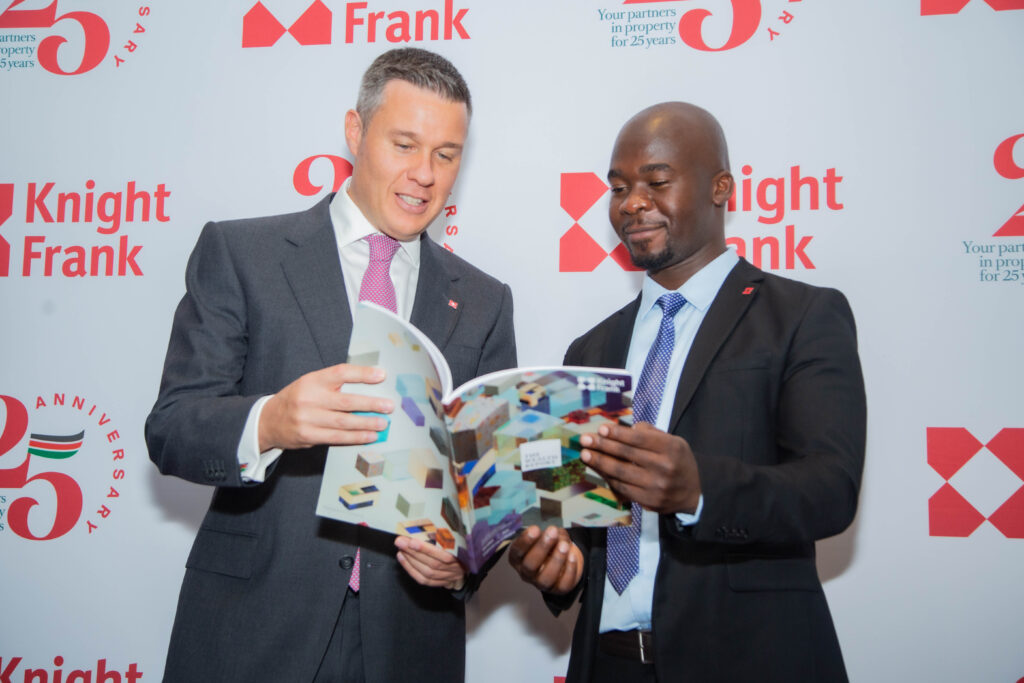
Mark Dunford,CEO Knight Frank Kenya,Liam Bailey,Global Head of Research and Editor-in-Chief of The Wealth Report,Knight Frank
Knight Frank Kenya Releases H2-2023 Market Update:Real Estate Market remains resilient amidst macro-economic challenges.
Knight Frank Kenya, a leading real estate agency, has released its 2nd Half 2023 Kenya Market Update, offering comprehensive insights into the country’s real estate landscape against the backdrop of challenging global economic conditions.
According to Mark Dunford, CEO of Knight Frank Kenya, “Despite unprecedented challenges, the Kenya real estate market has demonstrated durability and adaptability, positioning itself for continued growth.”
MACRO ECONOMY:
The global economy faced headwinds characterised by tough economic conditions.The World Bank predicted a slowdown in global economic growth in 2023.
However,Kenya bucks the trend, projecting a steady economic growth rate of approximately 5.0% in 2023 and 5.2% in 2024.
The Kenyan shilling experienced historic lows against major currencies, losing approximately 9.02% of its purchasing power since June 2023.
 Nevertheless, the Central Bank of Kenya is expected to continue implementing compact monetary policies in 2024 to try and counteract the depreciation trend.
Nevertheless, the Central Bank of Kenya is expected to continue implementing compact monetary policies in 2024 to try and counteract the depreciation trend.
CAPITAL MARKETS
Rising interest rates challenged the capital market, impacting loan demand and contributed to an investment slowdown.
The Nairobi Stock Exchange (NSE) recorded its fourth consecutive quarter of declining capitalisation value, while the bond market saw increased oversubscription of bonds issued by the Central Bank of Kenya (CBK).
Real Estate Investment Trusts (REITs) faced challenges, with some entities considering delisting.
INFRASTRUCTURE & POLICY:
Reduced national budget for infrastructure posed challenges, which led to an emphasis on public-private partnerships (PPPs).
Future projects included the expansion of the Nairobi-Mombasa Expressway under a PPP model.
Kenya also promises continued strong collaboration with neighboring countries on various infrastructure projects.
Efforts to address climate change intensified, with the adoption of the first Global Stocktake at COP 28.
Despite challenges, the government committed to fast-tracking infrastructure projects for energy stability.
There will also be relief for landlords in 2024 as the government implements a reduction in the residential rental income tax rate.
 OFFICES:
OFFICES:
Historically, office take-up was slow due to economic challenges exacerbated by oversupply.
However, this situation is gradually changing, with prime office monthly rent in Nairobi remaining stable at USD 1.2 per sq. ft and office occupancy rates increasing from 71.5% in H1 2023 to 76.5% in H2 2023.
This was largely attributed to the absorption of space in recently completed A-grade developments even as B-grade office developments continued to face challenges.
One of the key takers of space continues to be the flexible office operators with Regus, Spaces, and Ikigai expanding their footprint in market with new branches.Supply in the pipeline of A grade developments was also limited.
RETAIL:
Nairobi’s retail sector adapted to market changes, with supermarket chains expanding into residential neighborhoods.
Notable retail centers completed during the review period included GTC Mall, My Town, Park Avenue Place in Nairobi, Promenade Mall in Mombasa, and Catholic Mall in Kakamega.
Additionally, fewer developments remain in the pipeline.
RESIDENTIAL:
The prime residential market, catering to diplomats and high-net-worth individuals, remained resilient.
Despite economic challenges, the residential prime sales market showed a 2.45% improvement over the last 12 months.
Longer durations for sales completions were observed, influenced by regulation challenges, economic conditions, inflation, and buyer-seller valuation disparities.
The prime residential rental market continued its upward trend and registered an annual appreciation of 5.85% to the year ended 2023.
HOSPITALITY
The hospitality sector experienced recovery from Covid-19 shocks, with a 29% increase in visitor arrivals between January and October 2023, compared to a similar period in 2022. Similarly, hotel occupancy rates had increased to 57% in Q3 2023, a 32% increase from a similar period in 2022.
Nevertheless, hotel management challenges persist, leading to established operators taking over management roles in new establishments.
Despite challenges, the sector expanded with new hotel openings and investments.
INDUSTRIAL:
The industrial sector gained momentum in Kenya, with investments in industrial parks, Special Economic Zones (SEZs) and Export Processing Zones (EPZs).
Chares Macharia, Senior Researcher at Knight Frank Kenya, said, “Kenya’s Vision 2030 aims for industrialisation, with one of the government interventions being the introduction of County Aggregation and Industrial Parks (CAIPs) to promote agro-manufacturing.
However, lack of proper infrastructure and a tough business environment continues to be a challenge,”.
ALTERNATIVE MARKET:
Investments in alternative sectors have surged in the last five years, with private equity firms leading the market.
Momentum in healthcare and affordable housing initiatives was observed.
Government interventions drove efforts in quality healthcare provision, while the affordable housing sector faced implementation challenges.
Click image below to access the 2nd Half 2023 Kenya Market Update






